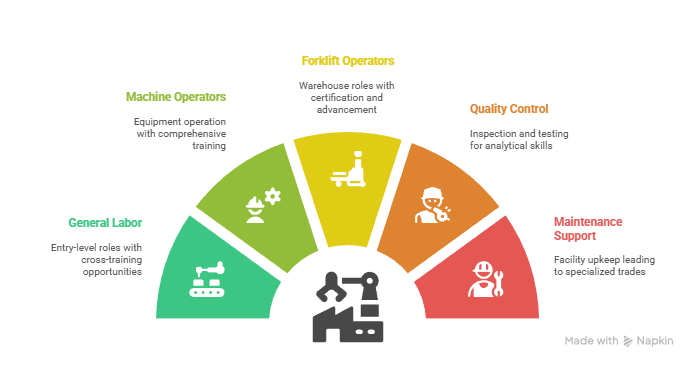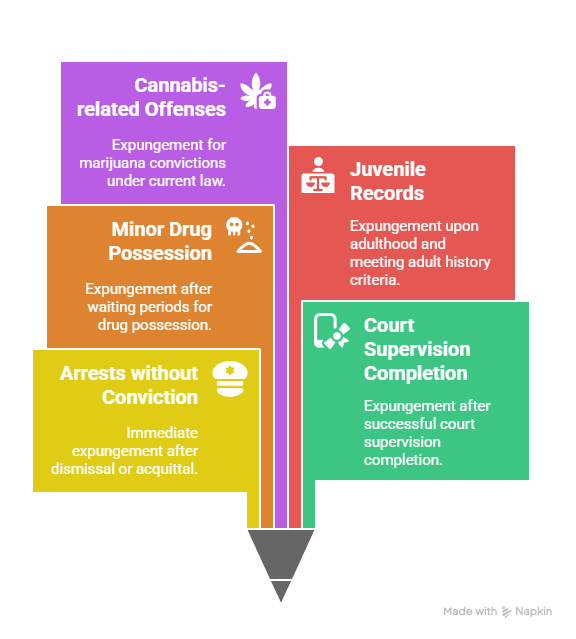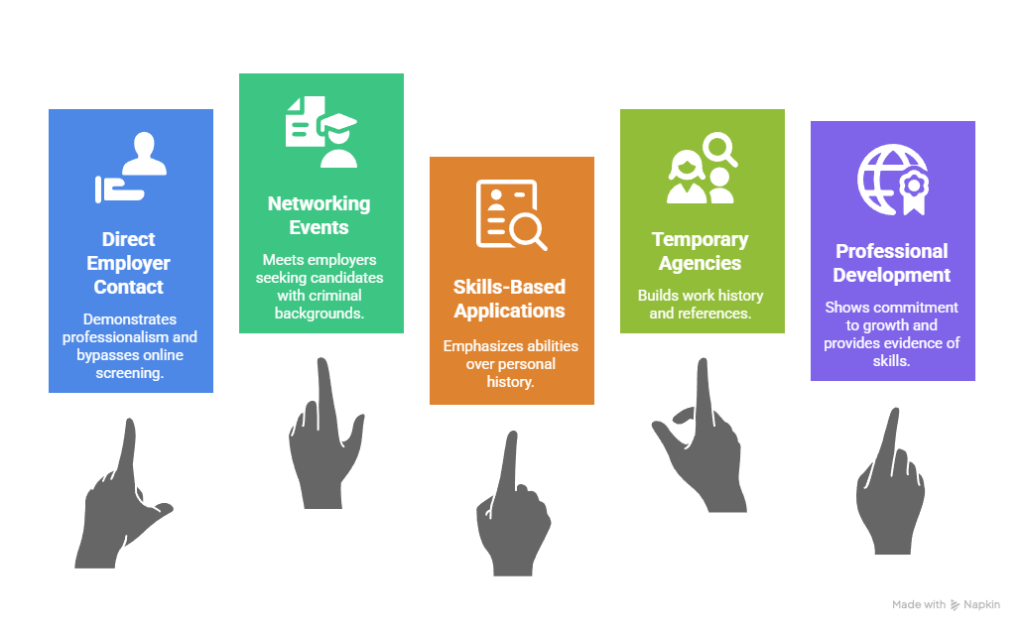Illinois offers expanding employment opportunities for individuals with criminal records through state-mandated fair chance hiring laws and growing second chance employer networks. Chicago leads the state with ban-the-box legislation and specialized reentry programs that connect formerly incarcerated individuals with sustainable career paths.
Key Takeaways
- Illinois follows Ban the Box legislation that restricts employers from asking about criminal history during initial application stages
- Chicago's Fair Chance Ordinance provides additional protections and requires individualized assessments for applicants with criminal backgrounds
- Manufacturing, construction, transportation, and hospitality sectors actively recruit second chance hires throughout Illinois
- State and local workforce development programs offer free job training, certification assistance, and placement services for returning citizens
- Expungement and record sealing options in Illinois can significantly improve employment prospects for eligible individuals
- Online job platforms and specialized staffing agencies increasingly focus on connecting employers with formerly incarcerated talent
Understanding Illinois Employment Laws for People with Criminal Records
Illinois has implemented progressive legislation to reduce employment barriers for individuals with criminal histories. The state's Human Rights Act prohibits employers from considering arrest records that did not result in conviction, while also restricting inquiries about criminal history during initial screening phases. These protections create more equitable hiring processes across the state and provide job seekers with stronger advocacy tools when facing potential discrimination.
The Illinois Equal Employment Opportunity Act requires employers to conduct individualized assessments when criminal history becomes relevant to employment decisions. This means employers must consider factors like the nature of the offense, time elapsed since conviction, and job-related relevance before making hiring decisions. The law also requires employers to provide written notices when criminal background influences hiring decisions, including specific information about which records were considered and how applicants can dispute inaccurate information. Understanding these legal protections helps job seekers advocate for fair treatment during the application process and ensures employers follow proper procedures when evaluating candidates with criminal backgrounds.
Recent updates to Illinois employment law have strengthened protections for formerly incarcerated individuals seeking jobs for felons in Illinois. The state now requires employers to wait longer periods before conducting background checks and mandates more comprehensive documentation when rejecting applicants based on criminal history. These changes reflect growing recognition that criminal background should not automatically disqualify qualified candidates from employment opportunities. Legal advocacy organizations throughout Illinois provide free assistance to individuals who believe employers have violated fair chance hiring laws during their job search process.
Chicago's Fair Chance Employment Opportunities
Chicago's Fair Chance Ordinance goes beyond state requirements by prohibiting criminal background inquiries until after a conditional job offer is made. This legislation applies to employers with five or more employees within city limits, creating expanded opportunities for initial job interviews and reducing screening process barriers. The ordinance also requires written explanations when employers withdraw job offers based on criminal history.
Leading Second Chance Employers:
- Amazon - Warehouse and logistics positions with immediate hiring programs
- JPMorgan Chase - Financial services roles through their Second Chance initiative
- Starbucks - Retail positions with advancement opportunities and benefits packages
- Walmart - Distribution center and retail jobs with competitive starting wages
- UPS - Package handling and delivery driver positions with union benefits
- McDonald's - Restaurant operations with flexible scheduling options
These companies demonstrate that criminal history doesn't preclude professional success or career growth. Their programs often include additional support services that help employees navigate workplace challenges and build long-term career stability.
Ban-the-Box Protections in Chicago
The policy includes specific timeline requirements that benefit job seekers throughout the application process. Employers must wait at least five business days before making final hiring decisions, allowing applicants time to provide additional context about their backgrounds. This waiting period creates opportunities for meaningful dialogue between employers and prospective employees about how past experiences have led to personal growth and professional development.
Chicago felon jobs benefit significantly from these extended timelines because they allow candidates to demonstrate their qualifications and work ethic before background checks become relevant. Many employers report that this process leads to better hiring decisions and reduced turnover rates among employees with criminal backgrounds.
Major Industries Embracing Second Chance Hiring
Healthcare support, food service, retail operations, and professional services increasingly recognize the value of hiring individuals with criminal backgrounds in the Chicago metropolitan area. These sectors have developed specialized training programs that address common workplace challenges while building on the life experience and resilience that many formerly incarcerated individuals bring to their positions. Hospital systems, restaurant chains, and retail companies often find that second chance hires demonstrate exceptional loyalty and work ethic compared to traditional employee populations.
High-Demand Industries for Felons in Illinois
Manufacturing, construction, and transportation sectors in Illinois face significant labor shortages that create excellent opportunities for second chance hires. These industries often prioritize skills and work ethic over criminal background during hiring processes, making them ideal starting points for individuals seeking stable employment. Many positions offer competitive wages with advancement potential and comprehensive benefits packages that include health insurance, retirement planning, and paid time off.
| Industry | Entry-Level Wage | Advancement Potential | Benefits Available |
| Manufacturing | $15-18/hour | Team lead, supervisor roles | Health, dental, 401k |
| Construction | $16-20/hour | Skilled trades, project management | Union benefits, training |
| Transportation | $17-22/hour | Dispatcher, fleet management | Insurance, bonuses |
The central location of Illinois makes it a distribution hub for major retailers and manufacturers, creating consistent demand for warehouse workers and logistics professionals throughout the state. This geographic advantage means that jobs for felons in Illinois remain abundant even during economic downturns, as companies continue needing workers to move goods through the region.
Manufacturing and Warehouse Jobs
Illinois's manufacturing sector offers abundant opportunities for individuals seeking stable employment without extensive background screening requirements. The state hosts major facilities for automotive parts, food processing, pharmaceutical packaging, and consumer goods production that regularly hire workers regardless of criminal history. These positions often provide competitive wages, health benefits, and advancement opportunities within growing companies that value reliability and attendance over past mistakes.
Production facilities throughout Illinois have discovered that formerly incarcerated workers often demonstrate exceptional punctuality, attention to detail, and appreciation for stable employment that translates into lower turnover rates and higher productivity. Many companies now actively recruit through reentry programs because these workers frequently outperform traditional hires in key metrics like attendance, safety compliance, and advancement within the organization.
Manufacturing Job Categories:

- General labor: Assembly line work requiring basic training with opportunities for cross-training across multiple production areas and advancement into specialized roles.
- Machine operators: Equipment operation positions that include comprehensive paid training programs leading to higher wages and increased responsibility for quality control.
- Forklift operators: Warehouse operations roles that provide certification assistance and often serve as stepping stones to supervisor positions within logistics departments.
- Quality control: Product inspection and testing positions that develop analytical skills valuable for advancement into technical and management roles.
- Maintenance support: Basic facility upkeep and equipment support roles that can lead to specialized trades training and significantly higher earning potential.
Manufacturing companies frequently promote from within, allowing dedicated employees to advance into supervisory and technical roles within 12-24 months of hire. Many facilities offer tuition reimbursement programs for employees pursuing additional education or certifications that enhance their value to the organization and create clear pathways for career advancement.
Construction and Skilled Trades
The construction industry in Illinois actively recruits individuals willing to learn skilled trades regardless of criminal history, focusing instead on physical ability, reliability, and willingness to learn. Union apprenticeship programs throughout the state prioritize work ethic and commitment to training rather than background checks, recognizing that many formerly incarcerated individuals possess the discipline and focus required for successful completion of demanding training programs. These programs combine paid on-the-job experience with classroom instruction for comprehensive skill development that leads to well-paying careers.
Construction work offers multiple career pathways from general labor positions starting at $16-18 per hour to specialized trades like electrical, plumbing, and HVAC installation that can earn $25-40 per hour or more after completing apprenticeships. The physical demands of construction work appeal to many individuals seeking active, hands-on careers that provide immediate feedback and visible results for their efforts. Illinois background check laws provide additional protections for construction workers, as many contractors focus primarily on safety records and skills rather than criminal history when evaluating potential employees.
Transportation and Logistics
Commercial driving positions often focus more on driving records and skills than criminal background, especially for local and regional routes that don't cross state lines or involve hazardous materials. The ongoing driver shortage means companies are increasingly willing to provide training and support for new drivers, including CDL training programs and guaranteed employment upon successful completion. Many transportation companies offer clear advancement opportunities from driving positions into dispatch, training, or fleet management roles that utilize the practical experience gained through route operations.
Local delivery services, freight companies, and logistics operations throughout Illinois have developed partnerships with reentry organizations to recruit qualified drivers who understand the value of stable employment. These positions often offer flexible scheduling, competitive pay, and opportunities for overtime that can significantly increase earning potential for dedicated employees.
Workforce Development Programs
Illinois operates comprehensive workforce development programs designed specifically for individuals with criminal backgrounds seeking sustainable employment opportunities. These programs include job placement assistance, skills training, ongoing support services, and case management that addresses common barriers to employment like transportation, housing, and financial stability. Participants receive individualized attention that continues for up to one year after job placement, ensuring long-term success rather than just immediate employment.
The state's investment in reentry programming reflects research showing that stable employment significantly reduces recidivism while contributing to community economic development and public safety. Programs maintain partnerships with hundreds of employers across Illinois who understand the benefits of second chance hiring and actively recruit program graduates for open positions.
Available Training Programs:
- Healthcare certifications: Medical assistant training programs lasting 6-12 months with high job placement rates in hospitals, clinics, and long-term care facilities throughout Illinois that offer competitive wages and advancement opportunities.
- Information technology: Help desk support and network administration courses that prepare participants for entry-level IT positions with growth potential in Chicago's expanding technology sector.
- Skilled trades: HVAC, electrical, and plumbing apprenticeship preparation programs that connect participants with union training opportunities and guaranteed employment pathways in high-demand construction fields.
- Customer service: Call center operations and retail management training that develops communication and problem-solving skills valued across multiple industries and often leads to supervisory roles.
- Commercial driving: CDL training programs with job placement assistance from trucking companies actively hiring throughout Illinois for local, regional, and long-distance routes.
Training programs typically last 3-12 months depending on the field, with many participants securing employment before program completion through employer partnerships and job fairs. The programs maintain strong relationships with local employers who regularly recruit graduates and understand the value of second chance hiring for building stable workforces.
Illinois Department of Corrections Reentry Services
Programming includes partnerships with local employers who understand the challenges faced by returning citizens and are committed to providing supportive work environments that encourage success. The department also offers transitional jobs programs that provide immediate employment while participants search for permanent positions, ensuring income stability during the job search process. These transitional positions often lead to permanent employment as participants demonstrate their value to employers.
Reentry services begin 90 days before release and continue for up to one year after placement, providing comprehensive support that addresses housing, transportation, financial management, and workplace adjustment challenges. This extended support model has proven highly effective in reducing recidivism while helping participants build sustainable careers and contribute positively to their communities.
Chicago Workforce Innovation and Opportunity Act Programs
Chicago's WIOA programs provide free job training, educational assistance, and placement services specifically designed for individuals facing employment barriers due to criminal backgrounds. The programs offer training in high-demand fields like healthcare, information technology, and skilled trades through partnerships with local colleges and training providers that understand the unique needs of formerly incarcerated students. Participants receive comprehensive support including transportation assistance, childcare referrals, career counseling, and financial planning services that address common barriers to program completion and employment success.
Background Check Process in Illinois
Illinois law limits how employers can use criminal history information in hiring decisions through specific guidelines that protect job seekers from discrimination based solely on criminal background. Employers cannot automatically disqualify applicants based on criminal records without conducting individualized assessments that consider job relevance, time elapsed since conviction, and evidence of rehabilitation or personal growth. The state also prohibits consideration of arrests that did not result in convictions, sealed records, and expunged offenses, ensuring that individuals who have cleared their records receive fair treatment during the screening process.
| Prohibited Considerations | Required Assessments | Timeline Requirements |
| Arrest records without conviction | Job relevance of offense | 5+ business days for decision |
| Sealed or expunged records | Time elapsed since conviction | Written explanation required |
| Minor traffic violations | Individual circumstances | Opportunity to respond |
The screening process typically occurs after conditional job offers, giving applicants opportunities to demonstrate their qualifications, work ethic, and professional capabilities before background checks become relevant to hiring decisions. This approach reduces bias in initial screening and ensures that criminal history is considered only when relevant to specific job requirements and responsibilities.
Illinois background check laws require employers to provide detailed written explanations when criminal history influences hiring decisions, including information about which specific records were considered, how they relate to job requirements, and what steps applicants can take to dispute inaccurate information or provide additional context about their circumstances. This transparency helps ensure fair treatment throughout the hiring process and reduces discrimination based solely on criminal history without consideration of individual circumstances or rehabilitation efforts.
Record Expungement and Sealing Options
Illinois offers several options for clearing or limiting access to criminal records, which can dramatically improve employment prospects for eligible individuals seeking better opportunities in competitive job markets. Expungement completely removes records from public access, making them unavailable to most employers during background checks, while sealing restricts access to specific authorized parties like law enforcement agencies while keeping records hidden from most private employers. The state has expanded eligibility for record relief in recent years, making these options available to more individuals seeking better employment opportunities and reduced barriers to housing, education, and professional licensing.
Second chance illinois programs often include assistance with record expungement and sealing applications, recognizing that clearing eligible records significantly improves employment outcomes and long-term stability for formerly incarcerated individuals. Legal aid organizations throughout the state provide free or low-cost assistance with record relief applications, helping individuals navigate the complex process and improve their chances of success.
Expungement Eligibility Requirements:

- Arrests without conviction: Most arrest records that did not result in convictions can be expunged immediately after case dismissal, acquittal, or charges being dropped by prosecutors.
- Court supervision completion: Successfully completed court supervision for most misdemeanor offenses qualifies for expungement after the supervision period ends without additional violations.
- Minor drug possession: Certain possession charges become eligible for expungement after specific waiting periods ranging from one to four years depending on the substance and amount involved.
- Juvenile records: Most juvenile offenses can be expunged automatically or by petition after the individual reaches adulthood and meets other requirements related to adult criminal history.
- Cannabis-related offenses: Recent legislation allows expungement of many marijuana-related convictions that are no longer criminal under current Illinois law.
Sealing options are available for many felony convictions after waiting periods ranging from three to seven years, depending on the offense classification and individual circumstances. Individuals can petition for relief without attorney representation, though legal assistance often improves success rates and reduces processing times significantly by ensuring proper documentation and procedure compliance.
The Application Process
The record relief process involves filing petitions with the court that handled the original case, along with supporting documentation that demonstrates eligibility and rehabilitation efforts since conviction. Applicants must obtain certified copies of their criminal history records from the Illinois State Police and pay required filing fees, though fee waivers are available for individuals with limited income who can demonstrate financial hardship. Processing times typically range from 60-120 days after filing complete applications, though complex cases or high court volumes may extend these timelines.
Successful petitions result in court orders directing law enforcement agencies to expunge or seal the specified records within 60 days of the order. Most employers, landlords, and educational institutions cannot access sealed or expunged records during background checks, significantly improving opportunities for housing, education, and employment in competitive markets where criminal history might otherwise create barriers to advancement.
Job Search Strategies and Resources
Finding employment opportunities requires strategic approaches that leverage available resources while addressing potential employer concerns about criminal history through professional presentation and demonstrated value. Successful job seekers often combine traditional application methods with networking opportunities, specialized services, and direct employer outreach that emphasizes skills and work ethic over past mistakes. Building professional relationships and demonstrating reliable work history creates long-term career success and advancement opportunities that lead to economic stability and community integration.
Effective job searching involves understanding which industries and employers actively practice second chance hiring, tailoring applications to emphasize relevant skills and experience, and preparing for interviews by developing clear explanations of personal growth since conviction. Many successful individuals find that persistence and professionalism overcome initial challenges related to background screening, especially when they can demonstrate specific skills that meet employer needs.
Several online platforms specialize in connecting individuals with criminal backgrounds to employers who practice fair chance hiring policies and understand the value of second chance employees. These resources often include job listings from verified employers, resume assistance tailored to individuals with criminal backgrounds, and interview preparation specifically designed to address common concerns and questions. Many platforms also offer ongoing career support and advancement resources that help individuals build sustainable careers over time rather than just finding immediate employment.
Effective Job Search Strategies:

- Direct employer contact: Visit businesses in person to demonstrate professionalism, work ethic, and genuine interest in available positions while bypassing online screening processes.
- Networking events: Attend job fairs and community events focused on second chance hiring where employers specifically seek to meet qualified candidates with criminal backgrounds.
- Skills-based applications: Emphasize relevant abilities, work experience, and educational achievements over personal history while being prepared to address background questions honestly when asked.
- Temporary agencies: Build work history and professional references through staffing companies that often focus more on availability and reliability than criminal background checks.
- Professional development: Complete certifications and training programs that demonstrate commitment to growth and provide concrete evidence of current skills and knowledge.
Online Resources and Specialized Platforms
Digital job search platforms designed for formerly incarcerated individuals offer unique advantages including pre-screened employers who welcome second chance hires, application processes that minimize background check barriers, and additional support services like resume writing and interview coaching. These platforms reduce the time and effort required to identify supportive employers while providing resources that improve long-term career success and workplace integration.
Many users report higher response rates and more positive interview experiences compared to traditional job search methods, as participating employers already understand and appreciate the value of second chance hiring. These platforms often feature success stories and career advancement examples that provide motivation and practical guidance for job seekers navigating the reentry process.
Conclusion
Illinois offers significant opportunities for individuals with criminal backgrounds through progressive employment laws, expanding second chance hiring programs, and comprehensive workforce development services that address barriers to sustainable employment. Chicago's Fair Chance Ordinance and statewide ban-the-box legislation create more equitable hiring processes across multiple industries while protecting job seekers from discrimination based solely on criminal history. The combination of high-demand sectors like manufacturing, construction, and transportation with supportive reentry programs provides clear pathways to economic stability and career advancement. Success requires strategic job searching, understanding legal protections, leveraging available resources, and considering record expungement options that can permanently improve employment prospects and reduce long-term barriers to professional growth.
Frequently Asked Questions
Can employers in Illinois ask about criminal history on job applications?
No, Illinois ban-the-box legislation prohibits employers from asking about criminal history during initial application phases. Employers can only conduct background checks after making conditional job offers, and they must follow specific procedures when criminal history influences hiring decisions.
What types of jobs are most available for people with felony convictions in Illinois?
Manufacturing, warehouse, construction, transportation, and hospitality industries offer the most opportunities for individuals with criminal backgrounds. These sectors face worker shortages and often focus on skills and work ethic rather than criminal history during hiring processes.
How long do I have to wait before applying for record expungement in Illinois?
Waiting periods depend on the offense type and disposition. Arrests without conviction can often be expunged immediately, while felony convictions typically require waiting periods of 3-7 years after sentence completion before becoming eligible for sealing.
Does Chicago have additional protections beyond Illinois state law?
Yes, Chicago's Fair Chance Ordinance provides stronger protections including longer waiting periods before final hiring decisions and requirements for written explanations when job offers are withdrawn due to criminal history.
Are there free job training programs available for people with criminal records?
Yes, Illinois offers multiple free training programs through WIOA services, Department of Corrections reentry programs, and community organizations. These programs include healthcare certifications, skilled trades training, and information technology courses.
Can I get help with job placement after completing training programs?
Most workforce development programs in Illinois include job placement assistance, employer partnerships, and ongoing support services. Many participants secure employment before completing their training programs through these placement services.
Additional Resources
- Illinois Department of Employment Security - Reentry Services
https://www.ides.illinois.gov/employers/reentry-services - Chicago Workforce Innovation and Opportunity Act Programs
https://www.chicago.gov/city/en/depts/fss/supp_info/workforce-development - Illinois Legal Aid Online - Criminal Record Relief
https://www.illinoislegalaid.org/legal-information/criminal-record-relief - 70 Million Jobs - National Employment Platform
https://www.70millionjobs.com/ - Center for Employment Opportunities - Chicago Office
https://ceoworks.org/locations/chicago/ - Illinois Department of Corrections - Reentry Programs
https://www2.illinois.gov/idoc/reentry/Pages/default.aspx - Chicago Fair Chance Ordinance Information
https://www.chicago.gov/city/en/depts/cchr/supp_info/fair-chance-ordinance

GCheck Editorial Team
Meet the GCheck Editorial Team, your trusted source for insightful and up-to-date information in the world of employment background checks. Committed to delivering the latest trends, best practices, and industry insights, our team is dedicated to keeping you informed.
With a passion for ensuring accuracy, compliance, and efficiency in background screening, we are your go-to experts in the field. Stay tuned for our comprehensive articles, guides, and analysis, designed to empower businesses and individuals with the knowledge they need to make informed decisions.
At GCheck, we're here to guide you through the complexities of background checks, every step of the way.





